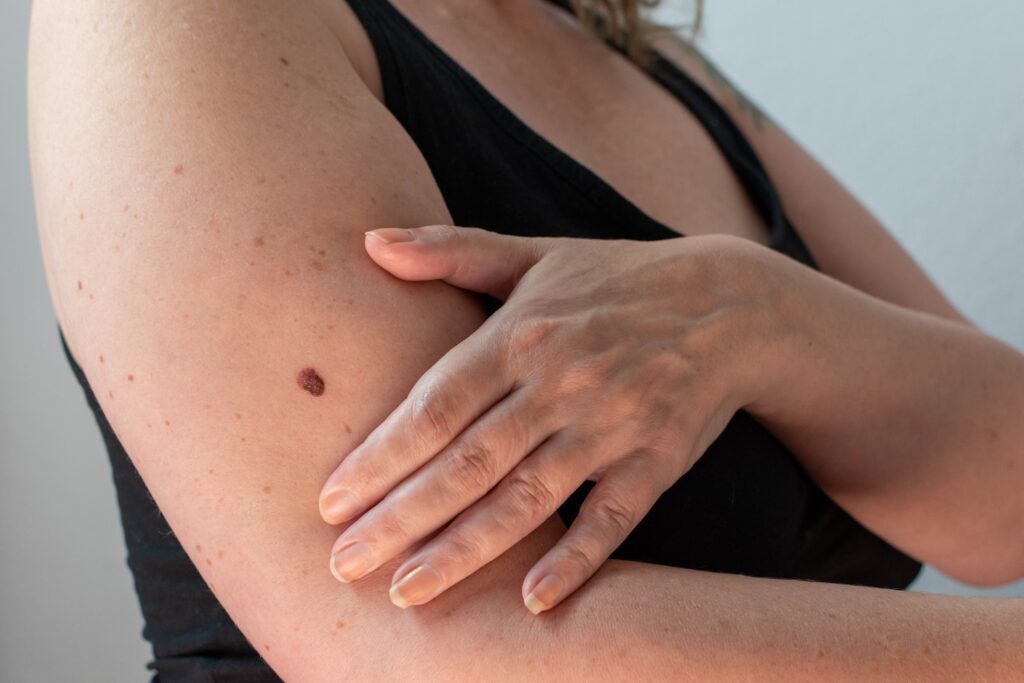Every day in the US, it is estimated that over 9,500 people receive a skin cancer diagnosis. It is the most commonly diagnosed type of cancer. Learning more about skin cancer and the associated risk factors may help you to lower your risk of getting this disease. Another vital bit of information pertains to early detection since an earlier diagnosis could contribute to a more favorable outcome.
What is Skin Cancer?
Skin cancer is a type of cancer that originates in the skin cells. In most cases, it affects the head, neck, face, hands, and other areas of the body that are regularly exposed to the sun. There are three most common types of skin cancer: basal cell carcinoma, squamous cell carcinoma, and melanoma.
Basal Cell Carcinoma (BCC)
The most common skin cancer type is basal cell carcinoma. It usually affects the areas of the body exposed to the sun. It can have many presentations, but most classically appear as a shiny pink patch or a pink waxy or pearly bump. This type of skin cancer does not tend to affect your overall health, but with time can grow locally and become painful or bleed.
Squamous Cell Carcinoma (SCC)
Squamous cell carcinoma may look like a red, firm nodule or a lesion that is flat and has a crusty or scaly surface. It is the second most common skin cancer type. Typically it is a local cancer that does not often spread to the remainder of the body, however, if they are left untreated, they can spread to other parts of the body and affect your overall health.
Melanoma
While less common than the other two types, melanoma tends to be more aggressive. It starts in the melanocytes which are the cells that produce pigment (melanin) in your body. This type of skin cancer can occur anywhere on the body, including areas that do not get a lot of sun exposure but is most common in areas with increased sun exposure. It usually looks like a mole that is asymmetric, has irregular borders, a larger diameter, and may have uneven coloration. Melanomas can also be identified as moles that have changed recently or as new moles, especially when these new moles appear in an older individual.
Skin Cancer Risk Factors
There are several factors that can increase your risk of developing skin cancer. These include, but are not limited to:
- Sun exposure
- Family or personal history of this cancer
- Having fair hair, eyes, and skin
- Increased number of moles
- History of atypical moles
- Older age
- Weakened immune system (ex. immunosuppressed, immunocompromised)
- Being a male
- Having a job where you work in the sun
- History of intense sunburns
- Living at a high altitude or in a sunny climate
- Using tanning beds
Detecting Skin Cancer Early
The prognosis may be more favorable if you get an early diagnosis. Perform a self-exam every few months. In fact, it is estimated that nearly ½ of all melanomas are self-detected.
Look at your body in the mirror and if you notice any new spots or changes in already existing moles, spots, or freckles, schedule an appointment with your doctor. It is also important to consider an eye examination for the early detection of ocular melanoma if you notice any irregular pigment in your eyes.
Importance of Skin Exams
A significant number of individuals can benefit from a regular skin exam, especially those individuals with a history of excessive sun exposure or with a personal or family history of skin cancer. A skin exam can help to detect skin cancer early and it lets you know if there are any other skin irregularities you should be aware of. Your doctor will do a visual inspection of your skin and make note of anything that is abnormal. They may also use a dermatoscope to help look at skin lesions and moles more closely if they are present.
Schedule a Consultation
Skin cancer can affect anyone, however, early detection can greatly improve patient outcomes. A skin exam is one step you can take to catch skin cancer as soon as possible if it occurs. Call Arlington Dermatology or fill out our online contact form today to schedule your yearly skin exam and to learn more about your skin’s health.



